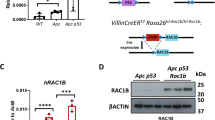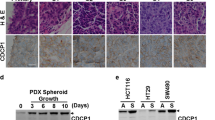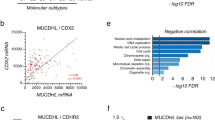Abstract
The expression of the protein DCC (deleted in colorectal cancer) is lost or markedly reduced in numerous cancers and in the majority of colorectal cancers due to loss of heterozygosity in chromosome 18q, and has therefore been proposed to be a tumour suppressor1. However, the rarity of mutations found in DCC, the lack of cancer predisposition of DCC mutant mice, and the presence of other tumour suppressor genes in 18q have raised doubts about the function of DCC as a tumour suppressor2. Unlike classical tumour suppressors, DCC has been shown to induce apoptosis conditionally: by functioning as a dependence receptor, DCC induces apoptosis unless DCC is engaged by its ligand, netrin-1 (ref. 3). Here we show that inhibition of cell death by enforced expression of netrin-1 in mouse gastrointestinal tract leads to the spontaneous formation of hyperplastic and neoplastic lesions. Moreover, in the adenomatous polyposis coli mutant background associated with adenoma formation, enforced expression of netrin-1 engenders aggressive adenocarcinomatous malignancies. These data demonstrate that netrin-1 can promote intestinal tumour development, probably by regulating cell survival. Thus, a netrin-1 receptor or receptors function as conditional tumour suppressors.
This is a preview of subscription content, access via your institution
Access options
Subscribe to this journal
Receive 51 print issues and online access
$199.00 per year
only $3.90 per issue
Buy this article
- Purchase on Springer Link
- Instant access to full article PDF
Prices may be subject to local taxes which are calculated during checkout




Similar content being viewed by others
References
Fearon, E. R. et al. Identification of a chromosome 18q gene that is altered in colorectal cancers. Science 247, 49–56 (1990)
Fazeli, A. et al. Phenotype of mice lacking functional Deleted in colorectal cancer (Dcc) gene. Nature 386, 796–804 (1997)
Mehlen, P. et al. The DCC gene product induces apoptosis by a mechanism requiring receptor proteolysis. Nature 395, 801–804 (1998)
Serafini, T. et al. Netrin-1 is required for commissural axon guidance in the developing vertebrate nervous system. Cell 87, 1001–1014 (1996)
Keino-Masu, K. et al. Deleted in Colorectal Cancer (DCC) encodes a netrin receptor. Cell 87, 175–185 (1996)
Forcet, C. et al. Netrin-1-mediated axon outgrowth requires deleted in colorectal cancer-dependent MAPK activation. Nature 417, 443–447 (2002)
Llambi, F., Causeret, F., Bloch-Gallego, E. & Mehlen, P. Netrin-1 acts as a survival factor via its receptors UNC5H and DCC. EMBO J. 20, 2715–2722 (2001)
Bordeaux, M. C. et al. The RET proto-oncogene induces apoptosis: a novel mechanism for Hirschsprung disease. EMBO J. 19, 4056–4063 (2000)
Stupack, D. G., Puente, X. S., Boutsaboualoy, S., Storgard, C. M. & Cheresh, D. A. Apoptosis of adherent cells by recruitment of caspase-8 to unligated integrins. J. Cell Biol. 155, 459–470 (2001)
Thibert, C. et al. Inhibition of neuroepithelial patched-induced apoptosis by sonic hedgehog. Science 301, 843–846 (2003)
Rabizadeh, S. et al. Induction of apoptosis by the low-affinity NGF receptor. Science 261, 345–348 (1993)
Mehlen, P. & Bredesen, D. E. The dependence receptor hypothesis. Apoptosis 9, 37–49 (2004)
Bredesen, D. E. et al. p75NTR and the concept of cellular dependence: seeing how the other half die. Cell Death Differ. 5, 365–371 (1998)
Kinzler, K. W. & Vogelstein, B. Lessons from hereditary colorectal cancer. Cell 87, 159–170 (1996)
Klingelhutz, A. J., Smith, P. P., Garrett, L. R. & McDougall, J. K. Alteration of the DCC tumor-suppressor gene in tumorigenic HPV-18 immortalized human keratinocytes transformed by nitrosomethylurea. Oncogene 8, 95–99 (1993)
Meyerhardt, J. A. et al. Netrin-1: interaction with deleted in colorectal cancer (DCC) and alterations in brain tumors and neuroblastomas. Cell Growth Differ. 10, 35–42 (1999)
Hsu, Y. H., Shaw, C. K. & Chuong, C. M. Immunohistochemical localization of deleted-in-colon-cancer (DCC) protein in human epithelial, neural, and neuro-endocrine tissues in paraffin sections with antigen retrieval. Kaohsiung J. Med. Sci. 17, 351–357 (2001)
Simon, T. C., Cho, A., Tso, P. & Gordon, J. I. Suppressor and activator functions mediated by a repeated heptad sequence in the liver fatty acid-binding protein gene (Fabpl). Effects on renal, small intestinal, and colonic epithelial cell gene expression in transgenic mice. J. Biol. Chem. 272, 10652–10663 (1997)
Fearon, E. R. & Vogelstein, B. A genetic model for colorectal tumorigenesis. Cell 61, 759–767 (1990)
Fodde, R. et al. A targeted chain-termination mutation in the mouse Apc gene results in multiple intestinal tumors. Proc. Natl Acad. Sci. USA 91, 8969–8973 (1994)
Thiebault, K. et al. The netrin-1 receptors UNC5H are putative tumor suppressors controlling cell death commitment. Proc. Natl Acad. Sci. USA 100, 4173–4178 (2003)
Tanikawa, C., Matsuda, K., Fukuda, S., Nakamura, Y. & Arakawa, H. p53RDL1 regulates p53-dependent apoptosis. Nature Cell Biol. 5, 216–223 (2003)
Acknowledgements
We wish to thank N. Gadot, C. Guix and G. Perret for excellent technical assistance. We also thank R. Fodde and S. Robine for advice and materials. This work was supported by the Ligue Contre le Cancer (P.M.), the Schlumberger Fondation (P.M.), the NIH (to P.M. and D.E.B.) and the Region Rhone-Alpes (to P.M. and J.Y.S.).
Author information
Authors and Affiliations
Corresponding author
Ethics declarations
Competing interests
The authors declare that they have no competing financial interests.
Supplementary information
Supplementary Figure 1
DCC inhibits anchorage-independent growth through apoptosis regulation. (JPG 38 kb)
Supplementary Figure 2
Netrin-1 overexpression does not modulate proliferation and differentiation of the intestinal epithelium. (JPG 118 kb)
Supplementary Figure 3
Increased cell death in the gastrointestinal tract of netrin-1 mutant mice. (JPG 42 kb)
Supplementary Figure 4
Netrin-1 and netrin-1 receptors localization in the intestinal epithelium and in hyperplastic/neoplastic lesions. (JPG 23 kb)
Supplementary Figure 5
Netrin-1 is overexpressed in 7% of human colorectal tumors. (JPG 132 kb)
Rights and permissions
About this article
Cite this article
Mazelin, L., Bernet, A., Bonod-Bidaud, C. et al. Netrin-1 controls colorectal tumorigenesis by regulating apoptosis. Nature 431, 80–84 (2004). https://doi.org/10.1038/nature02788
Received:
Accepted:
Issue Date:
DOI: https://doi.org/10.1038/nature02788
This article is cited by
-
ZNF133 is a potent suppressor in breast carcinogenesis through dampening L1CAM, a driver for tumor progression
Oncogene (2023)
-
Netrin-1 induces the anti-apoptotic and pro-survival effects of B-ALL cells through the Unc5b-MAPK axis
Cell Communication and Signaling (2022)
-
Netrin-1 functions as a suppressor of bone morphogenetic protein (BMP) signaling
Scientific Reports (2021)
-
Interleukin-34 promotes tumorigenic signals for colon cancer cells
Cell Death Discovery (2021)
-
The enteric nervous system in gastrointestinal disease etiology
Cellular and Molecular Life Sciences (2021)
Comments
By submitting a comment you agree to abide by our Terms and Community Guidelines. If you find something abusive or that does not comply with our terms or guidelines please flag it as inappropriate.



